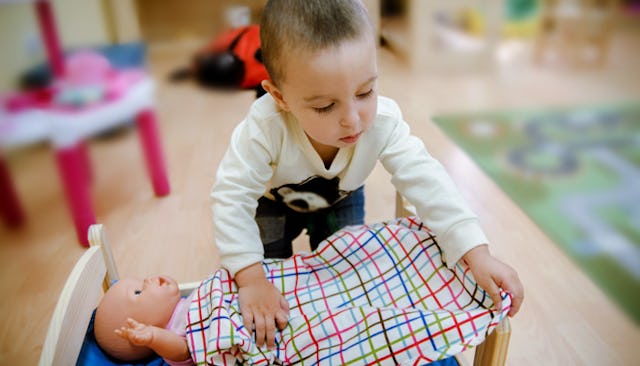Why Boys Need To Play With Girl Toys Too

A professor of experimental physics at Cambridge University, Dame Athene Donald, has criticized toy makers for marketing to either boys or girls, arguing that traditional girls’ toys emphasize passive play while boys’ toys encourage imagination, creativity and engineering skills, reports Ian Sample at The Guardian. He quotes Donald, who will be the new president of the British Science Association: “We introduce social constructs by stereotyping what toys boys and girls receive from the earliest age. “Girls’ toys’ are typically liable to lead to passivity—combing the hair of Barbie, for instance—not building, imagining or being creative with Lego or Meccano.”
Hang on. The definition of “passive” here is a little shaky. Since when is combing hair passive play? The child is combing the doll’s hair—an active gesture. I suspect that what Donald means is not “passive” but “caretaking,” and care work is simply not as valued in our culture, as say, engineering. If it were, then nurses, in-home caregivers, day-care staffers, hospice workers and hairdressers would all be paid as much as the guy who designed, I dunno, the app that lets you pretend to staple something.
As soon as I read that description of the Barbie doll, I had an image of my childhood self brushing the hair on my beloved Farrah Fawcett doll. It’s a short leap from that to remembering that I have also washed and combed the hair of my grandmother and mother when they were ailing and painted their toenails to cheer them up. I’m an only child, so I can’t say that a hypothetical brother wouldn’t have done the shampoos and pedicures, but based on friends’ experiences, this kind of care work generally falls to the women in the family. Donald is right—we’re socialized to do this from early childhood with our toy nurse kits and beauty salons. But the problem is not only that girls are socialized to do care work, it’s also that boys are not socialized to do care work.
The problem is a vicious cycle: We encourage girls, beginning from their earliest play sessions, to enter undervalued professions, like social work or child care. When they do enter more prestigious science and engineering fields, they can’t tend to their family commitments as well as they’d like, because the profession doesn’t recognize that caring for a family is also an important part of one’s life. So the women drop out. The men who stay in demanding science careers have wives or nannies at home to shoulder the family work, and the profession isn’t recognizing that its very existence relies on an unseen labor force of caregivers. As a result, women are underrepresented in lucrative STEM fields, meaning a dearth of female role models for kids. And girls keep playing with Barbie’s hair, mimicking the adult women they see around them. Another generation of girls are shunted caregiving fields, fields in which they’ll never make as much money as the “choose a fart sound for your ringtone” guy.
Target’s recent decision to remove gender labels from toys is a step in the right direction: Research shows that boys won’t play with toys that are marked as girls’ toys, and vice versa. Somehow we’ve got to encourage both boys and girls to reach for not only the Snap Circuits, but also the nurse play sets, and that starts by never letting them know that one used to be (ahem) considered “for boys” and one “for girls.”
It is a problem that girls are directed, from an early age, only to toys that emphasize grooming, caregiving, love and magic, rather than the “build stuff and fight” boys’ toys. There’s been a big push to steer girls to the Lego sets, but no similar big push to steer boys to the hairbrushes. It’s only by inculcating a love of care work—which is tremendously satisfying, both as pretend play and as a career—in both boys and girls that the culture at large will begin to value it. A combination of caregiving, science and math (and literature and drama and art, for that matter), makes for better, richer careers. But more than that, it makes for better human beings.